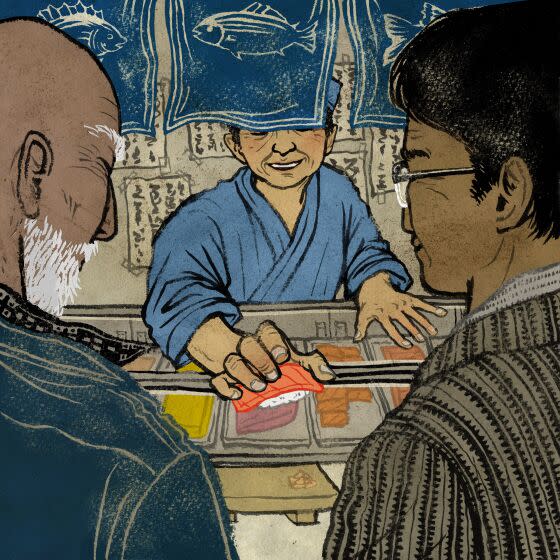The secret history of L.A.'s sushi revolution

Los Angeles is a sushi city — home to countless restaurants that treat raw fish with the sort of reverence usually reserved for religious rites. But this wasn't always the case. It took an unlikely alliance to make it happen.
It started in Tokyo in 1965, with a meal shared by two friends in the food import business who made an unplanned stop at a sushi house. It was Harry Wolff’s first encounter with the cuisine, and it sparked an idea that he shared with Noritoshi Kanai: If sushi could find purchase on the menus of L.A.’s Japanese restaurants, Kanai’s Mutual Trading Co. stood to benefit. It would import the items needed to serve sushi — from the nori to the knives.
The dream was to create the Southland's sushi ecosystem. But for the plan to work, L.A. restaurants needed to give sushi a shot. When the owner of Kawafuku agreed to open a sushi bar at his Little Tokyo haunt, the effort got a major boost. By the 1980s, sushi was ubiquitous, both as a cuisine and a cultural touchstone.
Kanai and Wolff — two friends bound by a love of food — sparked L.A.’s sushi obsession. And they changed the way Angelenos eat.
L.A.’s raw fish renegades
Read more: How two friends sparked L.A.’s sushi obsession — and changed the way America eats
The tangled tale of L.A.'s first sushi bar
Read more: This Little Tokyo restaurant is long gone. But it changed L.A.’s food scene forever
The visionary farm that jump-started L.A.'s sushi economy
Read more: L.A.’s sushi revolution was fueled by this secret ingredient from the Central Valley
A tour of L.A.'s sushi stronghold
Read more: Tracing L.A.'s sushi evolution on a walking tour of Little Tokyo
Read more: Addison: What makes L.A.’s sushi scene so great? I found answers in Tokyo
L.A. dreams of sushi
Read more: Los Angeles is the epicenter of sushi in America
This story originally appeared in Los Angeles Times.
